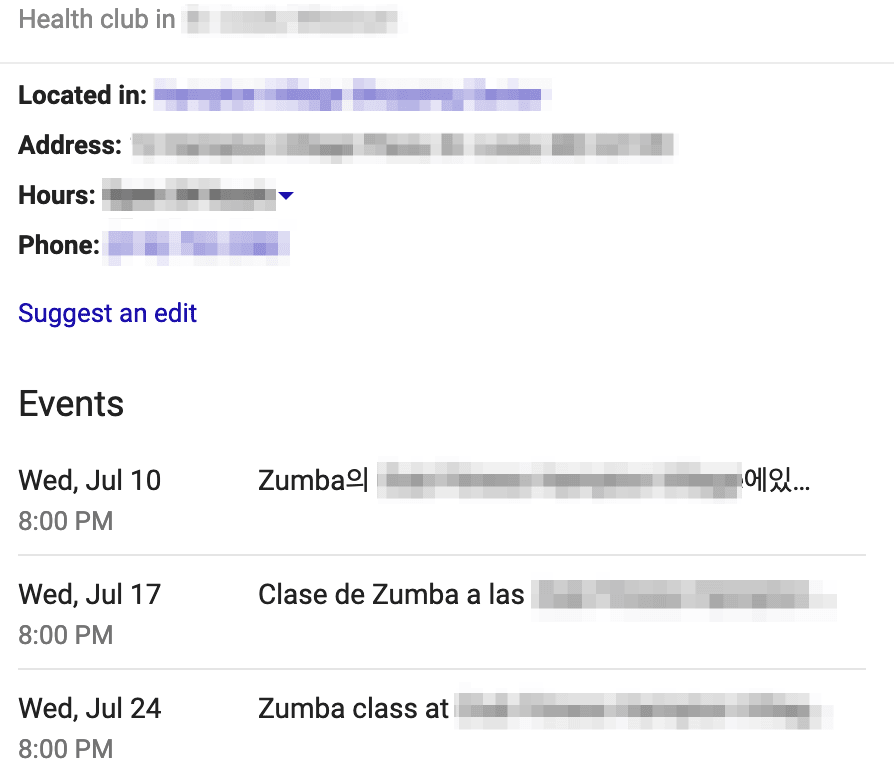In just over 20 years, Google has gone from a small start up to the monolith it is today. Google is ubiquitous and sometimes even seems omniscient. But in reality, Google isn’t perfect. Despite their ability to deliver perfectly packaged information, they’ve managed to design something so unclear—and so often incorrect—it baffles even the most experienced of Google users.
We’re talking about the Google My Business Knowledge Panel.
While the Knowledge Panel was launched to give business owners the opportunity to easily share crucial information with prospective customers—location, hours, contact information, and more—Google hasn’t managed to get the Events listings in it under control.
In a nutshell, Google occasionally lists completely incorrect events on the SERP.
We handle local SEO management for many of our clients and run into this problem often. We’ve seen events listed on incorrect dates and times; we’ve seen the same event listed in several different languages; we’ve even seen events listed that don’t even exist.
Not only is this problem a massive one, there’s no way for you to directly edit this information yourself.
In an effort to find a solution, we’ve spoken to Google reps, searched Twitter threads and pages of forums, and have tested quite a few strategies ourselves. Despite our best efforts, we still see these problems constantly.
For example, one of our clients is a fitness center with multiple locations; they hold regular group fitness classes with several different instructors. Each location has their class schedule on that location’s page. When you search for one of the locations, here’s what you’ll see in the Knowledge Panel on the right side of the SERP.

Notice that there are three different Zumba classes—all scheduled in July, despite the fact that it’s February at time of publishing. And each is listed in a different language. It doesn’t make much sense at all to have all of the events in different languages. (Oh and those four other events? One, scheduled in July, is in Italian; another, in August is in Portuguese; the last two are scheduled for January 2020 and are in Italian and Indonesian, respectively.)
What’s going on here?
Google is pulling the information for these events from third-party site zumba.com, Zumba’s official website. While it makes sense that Zumba would advertise a class on their site, it doesn’t seem logical to pull that information—in different languages and for months away—for the gym’s Knowledge Panel.
Google is recognizing the a third-party website as the authority on another company’s events.
See, Google will scan the website in question in addition to third-party sites to decide what information to pull in for the Knowledge Panel. However, as this example shows, they aren’t doing it perfectly—often, they aren’t even close.
We’re not the only one having these issues. See this tweet from Tim Capper, a consultant on local SEO:
Google @GoogleMyBiz is now scraping the bottom of the barrel with their #EventSpam
1. This is not an event and never was – its short film
2. It only mentions 10 Downing Street
3. No Structured Data Markup
4. Last modified 2016
5. #StopCrapOnTheMap pic.twitter.com/jsSHH37LOZ— Tim Capper (@GuideTwit) December 15, 2018
If not even the headquarters of the United Kingdom’s government can stop this, who can?
An obvious solution to this problem is to stop third-party information from showing up on your business listing. Wondering how to get this done?
Unfortunately, it’s not an easy answer.
In our experience, there’s not much you can do to stop it.
We’re not the only ones looking for solutions. Other local SEO experts have suggested the similar tactics that we already do for our clients: adding the correct information to your site, submitting your URL to the Google Search Console, and then adding information to third-party sites that you can control, like Yelp.
But that doesn’t guarantee that Google won’t give preference to higher-ranking sites anyway.
In fact, there seem to be very few guarantees on this topic—even from Google themselves.
When we spoke with a Google rep, they provided two solutions:
1. Reach out to third-party sites to change the information.
This plan assumes that the thousands of third-party sites that aggregate and disseminate your business’s information are willing (and able) to do this. It also assumes that Google will update the Knowledge Panel in a timely fashion. Neither of these are guaranteed.
2. Reach out to Google.
If you’ve ever had the pleasure of working with a Google representative, you’ll know that while they’re often quite friendly, they’re limited in what they can say and do. It can take several business days to hear back from them, and it’s easy for communication to drop. Stay on it in the hopes that they can change it on their end—or escalate it to someone who can.
While those strategies may work for you, they’re not what we like to rely on.
Sure, we go through that dance every time we see an issue, but we also choose to be proactive about our local listing information, in the hopes that we can prevent these problems before they start.
Here’s how Digital Strike handles events through Google My Business:
1. List individual events on their own page.
We noticed that the Zumba website in the example above had each event listed on its own page with its own unique URL. On the other hand, other sites sometimes put all their events on one page, utilize PDF calendars, or don’t list events on their site at all, instead relying on social media to get the word out.
By giving each event its own page, you’re hopefully signaling to Google that this event is important. Plus you’ll have room to add in all the important specifics, like the date, time, location, cost, and any other information your customers will need.
Be incredibly thorough with this step and hopefully Google will choose your correct information over a third party’s incorrect details.
2. Then add event schema to the page.
Schema is a data markup system that helps search engines, like Google, understand what’s on your page. Take the schema for Events and add it to your page through tag manager to help Google crawl the information and pull out what’s most important for your customers.
3. Actively maintain your entire Google My Business listing.
As part of our local SEO work for clients, we’re constantly making sure that each bit of information on their GMB is correct. That means looking at commonly searched information such as NAP (name, address, phone number) and hours, as well as pictures and questions from users.
While this may not have an effect on the events listings themselves, we still focus on putting your best foot forward for Google and all of your customers to see.
It’s important to note that these strategies are proactive ones, meaning we aren’t sure how effective they are if the Google My Business Knowledge Panel contains incorrect information.
If your GMB Events listings are incorrect, 1) know that we empathize, and 2) get in touch with us. We’ll give you a free consultation to help determine what’s going wrong with your Events listings—and we’ll show you how we can manage the rest of your local listing information to make sure customers are finding what you actually want them to see.






